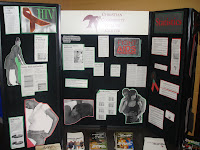Please bear with me as my thoughts aren't the clearest but it's important for me to share this today.
My earliest memories of HIV/AIDS came from my family. My grandmother is a nurse and worked in the "AIDS ward" at the county hospital. As evidenced by the AIDS ward, this was a time when people knew very little about the disease. Many of my grandmother's patients, mostly gay men, had been disowned by their families due to fear and misinformation about the disease. My grandmother not only provided them with quality nursing care, she also took it upon herself to provide them with a sense of family. She developed relationships with some of her patients, invited them to her home and into our family. However, they were not always welcomed. I can remember one of my uncles saying something about not using the same dishes as a particular young man. This man also began coming to church with us thanks to my grandmother's influence. At some point, he decided to get baptized. I remember clearly the pastor stepping into the baptismal pool with rubber boots and rubber pants. If I recall correctly, he was the only person baptized that day. I remember thinking that both my pastor and my uncle were dumb. My grandmother fought on and eventually opened a non-profit org that provided housing for people living with HIV/AIDS.
I also remember reading about Rae Lewis Thornton and hearing her speak at my mother's graduation from nursing school in 1995. She changed how I saw the disease and her story would forever remain with me.
As I grew older, I'm sure I heard a lot about HIV/AIDS from the media. Who remembers listening to and watching Love Line in high school? As much as my mom didn't want me listening to or watching this show, I found it to be a great resource for information. It definitely helped me to make more informed decisions.
In college, I attended events and seminars and workshops on HIV/AIDS and safe sex. I attended discussions about the down low and the effect of HIV/AIDS on black women. I talked to my friends about it but somehow it seemed like it didn't affect us.
I can't remember when or how I found out but one of my uncles was diagnosed with HIV. In the summer of 2005, I watched my grandmother take care of him the way she had done for so many others. She tried everything she knew how and anything that anyone could think of. I watched my father take care of him in ways I'd never seen him look after anyone. I almost thought this was enough to change my father's life. Despite their best efforts and all the prayers that I'm sure were offered in his behalf, he succumbed to the disease. After that, it became a little more real for me.
I took my first HIV test because I thought my uncle would want me to, not because I thought it could really happen to me. I began getting regular STI and HIV tests because that's what adults do. I must say that I still didn't think it could happen to me. That is until right before I went into that room to take the test. This was before rapid testing. So from the time I went into that room til 2-3 weeks later when I could come back to get the results, I wondered if it could happen to me. Then, I went right back into the nah, not me mode until next time.
In 2006, I took a job in health care. I began working with people who were living with the disease. Some people had given up and resigned themselvea to remaining at a long-term care facility. Others were motivated to return to their homes or live with family and friends. I watched as some people cared for them as my grandmother had her patients. I advocated for them when others acted as if we were still in the age of misinformation.
In reflecting upon my academic career, I have also conducted a lot of research on HIV/AIDS. I have learned a lot about the disease but what stands out the most is the changing face of the disease. The women, most of whom look like me, and children who are being infected saddens me the most. It has been more than 20 years but the message has not spread to everyone.
I think it is time I start to do my part to make sure the message gets to more people. Today, my 27th birthday, I finally took a stand. I didn't do anything major. I'm posting this blog, posted testing information on my facebook status and I went to be tested. Yes, that 20 minutes was just as nervewrecking as those 2-3 weeks. This time though, I think I grew a little. I made a decision to be tested in my community though I was up north earlier today. As I looked around a room full of people who looked like me, I knew that someone would test positive. Because of that, I could not breathe a sigh of relief. In that moment, I challenged myself to do more. I've wanted to do more for a long time. So, I'm hoping that BL was right when she said that 27 is the age when you come into your own and become the adult you know you need to be. I need this to be true for me and if today is any indication, it will be.
I'll leave you with some photos from today's event.




X-Posted at silence is sound.
1 comment:
Good stuff! Thanks for posting your Day!
We dont spend enough time really thinking about this or talking about it.
Its almost as if we think its not real. But its real. And its killing so many of us across the globe.
Post a Comment